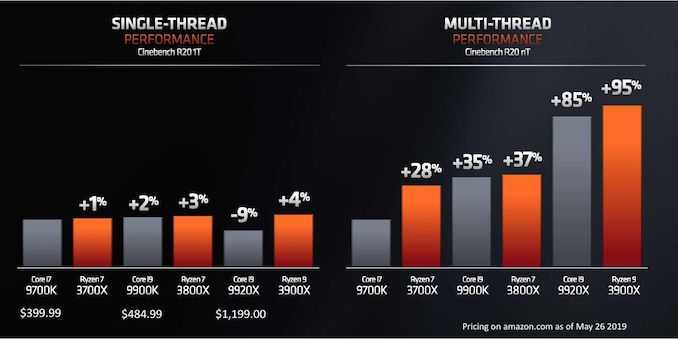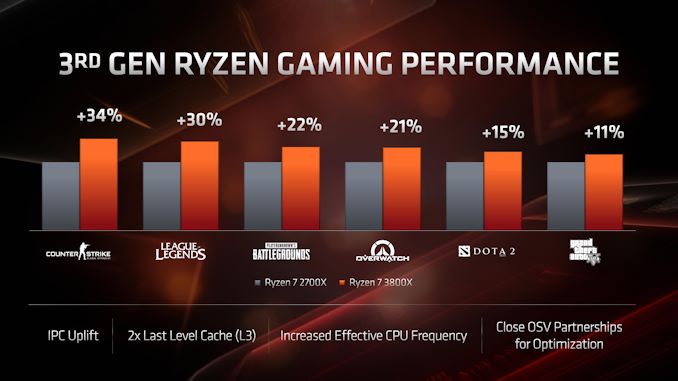AMD Zen 2 Microarchitecture Analysis: Ryzen 3000 and EPYC Rome
by Dr. Ian Cutress on June 10, 2019 7:22 PM EST- Posted in
- CPUs
- AMD
- Ryzen
- EPYC
- Infinity Fabric
- PCIe 4.0
- Zen 2
- Rome
- Ryzen 3000
- Ryzen 3rd Gen
Performance Claims of Zen 2
At Computex, AMD announced that it had designed Zen 2 to offer a direct +15% raw performance gain over its Zen+ platform when comparing two processors at the same frequency. At the same time, AMD also claims that at the same power, Zen 2 will offer greater than a >1.25x performance gain at the same power, or up to half power at the same performance. Combining this together, for select benchmarks, AMD is claiming a +75% performance per watt gain over its previous generation product, and a +45% performance per watt gain over its competition.
These are numbers we can’t verify at this point, as we do not have the products in hand, and when we do the embargo for benchmarking results will lift on July 7th. AMD did spend a good amount of time going through the new changes in the microarchitecture for Zen 2, as well as platform level changes, in order to show how the product has improved over the previous generation.
It should also be noted that at multiple times during AMD’s recent Tech Day, the company stated that they are not interested in going back-and-forth with its primary competition on incremental updates to try and beat one another, which might result in holding technology back. AMD is committed, according to its executives, to pushing the envelope of performance as much as it can every generation, regardless of the competition. Both CEO Dr. Lisa Su, and CTO Mark Papermaster, have said that they expected the timeline of the launch of their Zen 2 portfolio to intersect with a very competitive Intel 10nm product line. Despite this not being the case, the AMD executives stated they are still pushing ahead with their roadmap as planned.
| AMD 'Matisse' Ryzen 3000 Series CPUs | |||||||||||
| AnandTech | Cores Threads |
Base Freq |
Boost Freq |
L2 Cache |
L3 Cache |
PCIe 4.0 |
DDR4 | TDP | Price (SEP) |
||
| Ryzen 9 | 3950X | 16C | 32T | 3.5 | 4.7 | 8 MB | 64 MB | 16+4+4 | 3200 | 105W | $749 |
| Ryzen 9 | 3900X | 12C | 24T | 3.8 | 4.6 | 6 MB | 64 MB | 16+4+4 | 3200 | 105W | $499 |
| Ryzen 7 | 3800X | 8C | 16T | 3.9 | 4.5 | 4 MB | 32 MB | 16+4+4 | 3200 | 105W | $399 |
| Ryzen 7 | 3700X | 8C | 16T | 3.6 | 4.4 | 4 MB | 32 MB | 16+4+4 | 3200 | 65W | $329 |
| Ryzen 5 | 3600X | 6C | 12T | 3.8 | 4.4 | 3 MB | 32 MB | 16+4+4 | 3200 | 95W | $249 |
| Ryzen 5 | 3600 | 6C | 12T | 3.6 | 4.2 | 3 MB | 32 MB | 16+4+4 | 3200 | 65W | $199 |
AMD’s benchmark of choice, when showcasing the performance of its upcoming Matisse processors is Cinebench. Cinebench a floating point benchmark which the company has historically done very well on, and tends to probe the CPU FP performance as well as cache performance, although it ends up often not involving much of the memory subsystem.
Back at CES 2019 in January, AMD showed an un-named 8-core Zen 2 processor against Intel’s high-end 8-core processor, the i9-9900K, on Cinebench R15, where the systems scored about the same result, but with the AMD full system consuming around 1/3 or more less power. For Computex in May, AMD disclosed a lot of the eight and twelve-core details, along with how these chips compare in single and multi-threaded Cinebench R20 results.
AMD is stating that its new processors, when comparing across core counts, offer better single thread performance, better multi-thread performance, at a lower power and a much lower price point when it comes to CPU benchmarks.
When it comes to gaming, AMD is rather bullish on this front. At 1080p, comparing the Ryzen 7 2700X to the Ryzen 7 3800X, AMD is expecting anywhere from a +11% to a +34% increase in frame rates generation to generation.
When it comes to comparing gaming between AMD and Intel processors, AMD stuck to 1080p testing of popular titles, again comparing similar processors for core counts and pricing. In pretty much every comparison, it was a back and forth between the AMD product and the Intel product – AMD would win some, loses some, or draws in others. Here’s the $250 comparison as an example:
Performance in gaming in this case was designed to showcase the frequency and IPC improvements, rather than any benefits from PCIe 4.0. On the frequency side, AMD stated that despite the 7nm die shrink and higher resistivity of the pathways, they were able to extract a higher frequency out of the 7nm TSMC process compared to 14nm and 12nm from Global Foundries.
AMD also made commentary about the new L3 cache design, as it moves from 2 MB/core to 4 MB/core. Doubling the L3 cache, according to AMD, affords an additional +11% to +21% increase in performance at 1080p for gaming with a discrete GPU.
There are some new instructions on Zen 2 that would be able to assist in verifying these numbers.















216 Comments
View All Comments
GreenReaper - Wednesday, June 12, 2019 - link
The last you heard? It says clearly on page 6 that there is "single-op" AVX 256, and on page 9 explicitly that the width has been increased to 256 bits:https://www.anandtech.com/show/14525/amd-zen-2-mic...
https://www.anandtech.com/show/14525/amd-zen-2-mic...
To be honest, I don't mind how it's implemented as long as the real-world performance is there at a reasonable price and power budget. It'll be interesting to see the difference in benchmarks.
arashi - Wednesday, June 12, 2019 - link
Don't expect too much cognitive abilities regarding AMD from HStewart, his pay from big blue depends on his misinformation disguised as misunderstanding.Qasar - Thursday, June 13, 2019 - link
HA ! so that explains it..... the more misinformation and misunderstanding he spreads.. the more he gets paid.......HStewart - Thursday, June 13, 2019 - link
I don't get paid for any of this - I just not extremely heavily AMD bias like a lot of people here. It just really interesting to me when Intel release information about new Ice Lake processor with 2 load / s store processor that with in a a couple days here bla bla about Zen+++. Just because 7nm does not mean they change much.Maybe AMD did change it 256 width - and not dual 128, they should be AVX 2 has been that way for a long time and Ice Lake is now 512. Maybe by time of Zen 4 or Zen+++++ it will be AVX 512 support.
Korguz - Thursday, June 13, 2019 - link
no.. but it is known.. you are heavily intel bias..whats zen +++++++++ ????
x 86-512 ??????
but you are usually the one spreading misinformation about amd...
" and support for single-operation AVX-256 (or AVX2). AMD has stated that there is no frequency penalty for AVX2 " " AMD has increased the execution unit width from 128-bit to 256-bit, allowing for single-cycle AVX2 calculations, rather than cracking the calculation into two instructions and two cycles. This is enhanced by giving 256-bit loads and stores, so the FMA units can be continuously fed. "
HStewart - Thursday, June 13, 2019 - link
Zen+++++ was my joke as every AMD fan jokes about Intel 10+++ Just get over itx-86 512 - is likely not going to happen, it just to make sure people are not confusing vector processing bits with cpu bits 64 bit is what most os uses now. for last decade or so
Intel has been using 256 AVX 2 since day one, the earlier version of AMD chips on only had two combine 128 bit - did they fix this with Zen 2 - this is of course different that AVX 512. which standard in in all Ice Lake and higher cpus and older Xeon's.
Qasar - Thursday, June 13, 2019 - link
sorry HStewart... but even sone intel fans are making fun of the 14++++++ and it would be funny.. if you were making fun of the process node.. not the architeCture..."
x-86 512 - is likely not going to happen, it just to make sure people are not confusing vector processing bits with cpu bits 64 bit is what most os uses now. for last decade or so " that makes NO sense...
HStewart - Thursday, June 13, 2019 - link
One more thing I stay away from AMD unless there are one that bias against Intel like spreading misinformation that AVX 512 is misleading. and it really not 512 surely they do not have proof of that.AVX 512 is not the same as x86-512, I seriously doubt we will ever need that that but then at time people didn't think we need x86-64 - I remember original day of 8088,. no body thought we needed more 64meg AVX-512 is for vectors which is totally different.
just4U - Thursday, June 13, 2019 - link
I always have a higher end Intel setup and normally a AMD setup as well.. plus I build a fair amount of setups on both. No bias here except maybe.. wanting AMD to be competitive. The news that dropped over the past month was the biggest for AMD in over a decade HS.. If you can't even acknowledge that (even grudgingly..) then geez.. I dunno.This has been awesome news for the industry and will put intel on their toes to do better. Be happy about it.
Xyler94 - Monday, June 17, 2019 - link
HStewart, please. You don't stay away from AMD at all. You take ANY opportunity to try and make Intel look better than AMD.There was an article, it was Windows on ARM. You somehow managed to make a post about Intel winning over AMD. Don't spew that BS. People don't hate Intel as much as you make them out to be, they don't like you glorifying Intel.